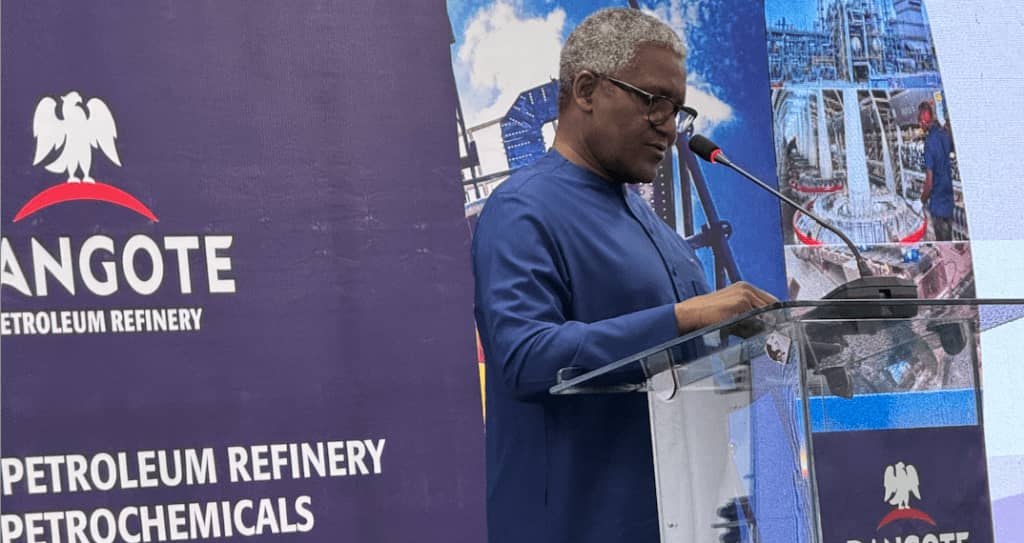Business
Dangote Refinery set new record, exceeds Nigeria’s fuel demand

Dangote Petroleum Refinery has announced that it now produces 45 million litres of Premium Motor Spirit (PMS), also known as petrol, every day, a volume it says surpasses Nigeria’s daily demand.
The company also confirmed the daily production of 25 million litres of diesel, pledging to maintain a consistent and reliable supply of both products across the country.
In a statement issued Friday, Anthony Chiejina, Group Chief Branding and Communications Officer of Dangote Industries Limited, said the refinery’s current output is more than enough to meet local consumption.
The announcement comes a day after the federal government approved a 15 per cent import duty on PMS, diesel, and jet fuel, a move that has stirred mixed reactions within the downstream oil sector.
READ ALSO:Dangote set to begin crude oil production in Niger Delta
While some economists and industry players welcomed the decision as a step toward protecting domestic refineries, others warned it could lead to an increase in pump prices.
Despite the Dangote Refinery commencing operations over a year ago, about 67 per cent of Nigeria’s daily fuel consumption still comes from imports.
However, Chiejina maintained that the 650,000-barrel-per-day facility is capable of satisfying the nation’s fuel needs.
According to him, “Our refinery is currently loading over 45 million litres of PMS and 25 million litres of diesel daily, which exceeds Nigeria’s demand.
“We are working collaboratively with regulatory agencies and distribution partners to guarantee efficient nationwide delivery. Dangote remains steadfast in its commitment to meeting the energy needs of Nigerians. This significant production capacity not only guarantees local supply but also enhances energy security and reduces dependence on imports.”
He added that increased local refining has contributed to the stabilisation of the exchange rate and a stronger naira.
“We have reduced foreign exchange outflows and increased inflows, which in turn supports the naira and strengthens the economy,” he said.
Chiejina criticised the continued importation of petroleum products despite adequate local supply, describing it as a threat to industrial growth.
“Dumping engenders poverty, discourages industrialisation, creates unemployment and leads to revenue loss for the government. Across the world, nations protect their local manufacturers and industries from the threat of dumping. Dumping destroyed our textile industry, which was once a major employer of labour and creator of wealth,” he said.
He urged the government to complement the new tariff policy with strict enforcement to prevent the importation of substandard or toxic products.
According to him, the new tariff regime will encourage investment in local refining and stimulate job creation in the downstream oil sector.
Chiejina commended President Bola Ahmed Tinubu for approving the policy, saying it reflects his administration’s commitment to creating a stable and business-friendly environment.
“President Bola Ahmed Tinubu continues to embody courageous and visionary leadership, renewing the hope of Nigerians and restoring investor confidence in the nation’s economy. His administration’s bold and business-friendly reforms are reshaping the downstream oil and gas sector, unlocking new opportunities for industrial growth and national prosperity. The latest policy initiative stands as a testament to his foresight — one of the most transformative steps yet toward securing Nigeria’s energy future and empowering local industries to thrive,” he said.
He warned that failing to protect local industries could expose Nigeria to massive product dumping from Asia and Europe, which could cripple domestic refineries and undermine government reforms.
Providing comparative data, Chiejina noted that in September 2024, the average pump price of petrol stood at ₦1,030 per litre, but dropped to ₦841–₦851 per litre by September 2025 under the Dangote Refinery’s Direct Delivery Scheme.
Diesel prices also fell significantly from ₦1,400–₦1,700 per litre in 2024 to around ₦1,020 per litre in 2025.
He added that petrol prices in neighbouring West African countries range between $1.20 and $2.00 per litre, compared to about $0.60 in Nigeria, highlighting the refinery’s impact on affordability and supply stability.






















